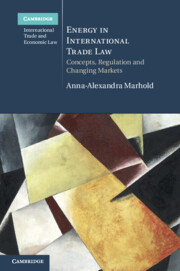Book contents
- Energy in International Trade Law
- Cambridge International Trade and Economic Law
- Energy in International Trade Law
- Copyright page
- Dedication
- Contents
- Tables
- Foreword
- Acknowledgements
- Tables of Cases
- Acronyms and Abbreviations
- Introduction and Objectives
- Part I Energy in International Trade Law: Concepts, History and Legal Framework
- Part II International Trade Law and Changing Energy Markets: Decentralization, Decarbonization and Energy Security
- 5 Decentralizing Energy Markets in the Light of International Trade Law: OPEC and the EU Internal Energy Market
- 6 Decarbonizing Energy Markets: Constraining Dual Pricing and Options for Fossil Fuel Subsidy Reform in the WTO
- 7 The Emerging Concept of Energy Security in International Trade Law
- 8 General Conclusion and Recommendations
- Bibliography
- Index
6 - Decarbonizing Energy Markets: Constraining Dual Pricing and Options for Fossil Fuel Subsidy Reform in the WTO
from Part II - International Trade Law and Changing Energy Markets: Decentralization, Decarbonization and Energy Security
Published online by Cambridge University Press: 24 June 2021
- Energy in International Trade Law
- Cambridge International Trade and Economic Law
- Energy in International Trade Law
- Copyright page
- Dedication
- Contents
- Tables
- Foreword
- Acknowledgements
- Tables of Cases
- Acronyms and Abbreviations
- Introduction and Objectives
- Part I Energy in International Trade Law: Concepts, History and Legal Framework
- Part II International Trade Law and Changing Energy Markets: Decentralization, Decarbonization and Energy Security
- 5 Decentralizing Energy Markets in the Light of International Trade Law: OPEC and the EU Internal Energy Market
- 6 Decarbonizing Energy Markets: Constraining Dual Pricing and Options for Fossil Fuel Subsidy Reform in the WTO
- 7 The Emerging Concept of Energy Security in International Trade Law
- 8 General Conclusion and Recommendations
- Bibliography
- Index
Summary
This chapter repositions the debate on dual pricing as part of the bigger challenge of combating climate change. It addresses dual pricing from the perspective of the broader task of reforming environmentally harmful fossil fuel subsidies. The chapter moves beyond the potentially discriminatory nature of dual pricing to lay out options for disciplining dual-pricing practices in the WTO system in the grounds of their negative environmental impact. After providing some background, the chapter explores two main avenues for dealing with dual pricing: it first discusses what possibilities exist under current WTO rules, and then it explores what action the WTO can take beyond its current legal toolkit in the wider context of fossil fuel subsidy reform. The key argument is that the WTO can be a crucial actor in eliminating dual-pricing policies and can facilitate and significantly contribute to fossil fuel subsidy reform.
Keywords
- Type
- Chapter
- Information
- Energy in International Trade LawConcepts, Regulation and Changing Markets, pp. 211 - 239Publisher: Cambridge University PressPrint publication year: 2021

